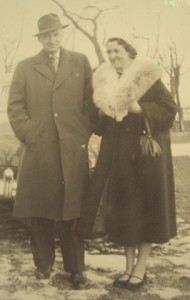Dad and Mom lived in four homes during 50 years of marriage: a newlywed bungalow, their bring-the-babies-home house, their larger place, and a downsized-ranch. Mom loved being a homemaker, and when Dad (13 years her senior) suggested a retirement community, she wouldn’t hear of it.
Later, when he died after only two weeks warning, Mom clung to their home like it was Dad himself. Being without him was heartbreaking, but it focused her attention on life after death like never before.
She told us about the night she was out watering her garden near midnight when she heard footsteps approaching. “Were you afraid?” I said.
“Actually I was hoping he had a gun and would do me in,” she said. “Then I’d get to be with your father.” She was only half joking.
Not long after that, Mom fell and broke her hip badly, requiring surgery. She had great confidence in the doctor, a family friend, but was secretly hoping the O.R. would be her launch pad to heaven. But the surgery went flawlessly, and Mary was there to tell her about it when she came out of the anesthetic.
Still groggy, Mom’s first word was, “Carl?”
“No,” Mary said. “It’s just me.”
Mom pulled the covers over her head and burst into tears, realizing she hadn’t ended up in heaven after all. Days later, well on the way to a full recovery she said, “I gave God a perfect chance to take me, and he passed it up.” (She lived 13 more years.)
Mom’s push toward heaven seemed extreme, but I admire two things about it: (1) her true love for Dad came through, and (2) her certainty of heaven was unshakeable. Day to day, hour to hour, a real heaven was on her mind, a specific place where her beloved had already gone.
Mom’s desire to be with Dad wasn’t her only heaven-themed longing. Her deepest craving was to run into the waiting arms of Jesus her Savior. She referenced that moment often and never doubted its authenticity. In 60 years as her daughter, I never heard a smidgen of uncertainty in her talk of one day living with Jesus.
Sometimes I find myself a little unsure. It isn’t exactly doubt, but it’s a serious wondering. How will it work when I move to the next world? The greeting we’ve heard some will get at heaven’s gate (well-done-good-and-faithful-servant) won’t apply to me. I love the Lord, but faithful servant? Not really. So, what are the other greeting possibilities? I wonder.
And what about the rush of guilt I’ll feel when I look into Jesus’ eyes? Or the regret that’ll sweep over me about my disobedience? What about my idle words? Time wasted? Bypassed opportunities? I wonder and wonder. How can it possibly go well?
But Mom? She never wondered. She was just plain sure, and that was delightfully refreshing.
“You guide me with your counsel, and afterward you will receive me to glory.” (Psalm 73:24)





